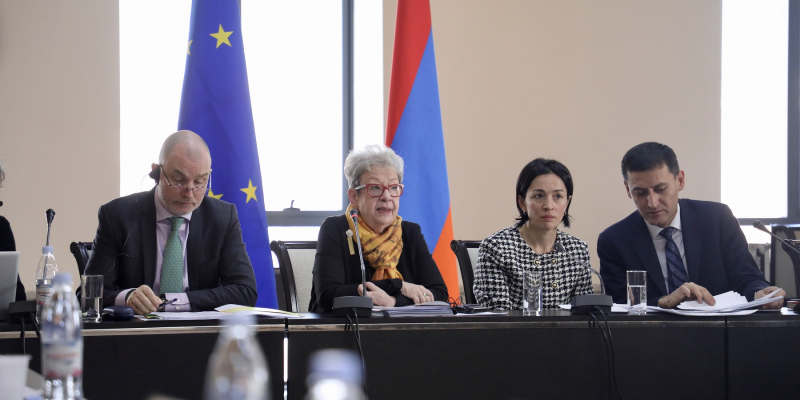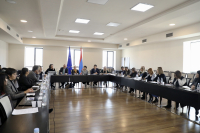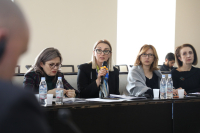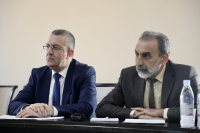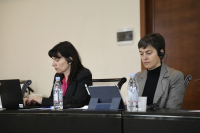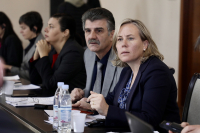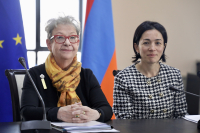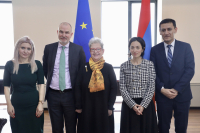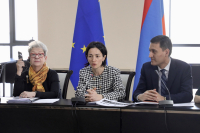Minister Zhanna Andreasyan and the Head of the Delegation of the European Union, Ambassador Andrea Viktorin participated in the discussion on "European Union-Armenia Education Dialogue", which was held today in the RA Ministry of Education, Science, Culture and Sports.
ESCS Deputy Ministers Arthur Martirosyan and Araqsia Svajyan, Directorate-General for the Unit of the European Commission for Armenia and Eastern Partnership David Cullen, representative of the European Investment Bank Stephanie Guihard-Brand, representatives of the Ministry and the European Union attended the event.
Welcoming the EU delegation to Armenia, Zhanna Andreasyan highlighted the importance of efficient cooperation with EU partners, in particular, at the stages of the development, approval and further implementation of the "RA Education Development State Program until 2030.”
“I think it is very symbolic to start the year with an event dedicated to joint education dialogue. This marks the efforts that we have already invested in the previous period to ensure the advancement of the education system of Armenia. In this regard, I attach particular importance to further cooperation with the EU in terms of the implementation of the “RA Education Development State Program until 2030”. As a result of our joint work, we have the program approved by the National Assembly and which is already an acting law. Next, an action plan that will contain measurability and a financial evaluation is also important: this will enable us to clearly visualize the map of our activities for the coming years. The support we have received from our partners in the EU is invaluable,” noted Zhanna Andreasyan expressing gratitude for the joint work and continuous support.
According to the ESCS Minister, the approval of the strategy opens up a complete chain of activities around which it is necessary to work and build further cooperation to turn them into a reality. The Minister also informed that a three-month deadline has been set for the approval of the action plan.
“Our priority is to turn the strategy into reality: one thing is to write a development strategy on paper, another thing is to turn it into a reality. The Education Development Strategy describes actions aimed at high-quality and affordable education services at all stages of life,” said Zhanna Andreasyan underlining that the partnership with the European Union is not limited only to education cooperation, it also includes the sectors of culture and science.
Zhanna Andreasyan confirmed her willingness to continue working together with EU partners in all sectors for the benefit of improving the quality of education in our country.
The head of the Delegation of the European Union, Ambassador Andrea Victorin highlighted the importance of launching the “EU-Armenia Education Dialogue”, stressing that the adoption of the “RA Education Development State Program until 2030” provides an opportunity to expand the prospects for cooperation.
EU partners have announced plans for the future, the objective of which is to support their implementation, emphasizing reforms in the field of general education. It was noted that within the framework of EU funding programs, issues of introducing a new educational model in Syunik and localization of the new standard of general education are being considered.
The parties also touched upon the development of structures organizing non-formal education in the format of COAF and TUMO centers, noting that they, together with the formal education system, summarize the efficiency of the organization of education․
Directorate-General for the Unit of the European Commission for Armenia and Eastern Partnership David Cullen, presenting the upcoming EU budget assistance program, highlighted the importance of having the necessary resources to effectively implement the reforms.
“I am impressed by the efforts of the Government of the Republic of Armenia in the development and approval of the “State Program for Education Development of the Republic of Armenia until 2030”. We join your efforts and express our full support at the stage of implementation of the action plan of the strategy. You have made up a very ambitious and important program for the future. We will be happy to contribute to its implementation,” said David Cullen.
During the meeting, the RA ESCS Deputy Ministers Arthur Martirosyan, Araqsia Svajyan and the Head of the Department for Higher and Postgraduate Professional Education Lusine Grigoryan presented the main directions of the educational strategy.
According to Arthur Martirosyan, the “State Program for Education Development of the Republic of Armenia until 2030” has been developed in the following strategic directions: universal inclusiveness, creating a learner-centered educational environment and enhancing the efficiency of education. The program covers all levels of education, starting from preschool to higher education.
“The strategy is based on a person, the development of human capital. All people have certain skills, talents, and the mission of the education system is to reveal these talents, giving a person the opportunity to self-realize for himself, for the development of the State and the economy,” noted the ESCS Deputy Minister, emphasizing that the internationalization and export of educational services and products are also one of the important issues emphasized.
Presenting the main provisions of the strategy regarding preschool and general education, ESCS Deputy Minister Araqsia Svajyan noted that the primary task of preschool education is to ensure the engagement of at least 95% of children aged 3-5 years in preschool programs: “The important conceptual provisions of the document are related to the provision of accessible and affordable educational institutions, the inclusion of all children entering school in pre-school programs for at least one year, the launch of nursery services in all enlarged communities, the proper furnishing of schools and equipping them with modern equipment, the improvement of building conditions and infrastructure, furnishing of digital, science technology, engineering, mathematics and other laboratories and libraries in an innovative style.”
Head of the Department for Higher and Postgraduate Professional Education of the MoESCS Lusine Grigoryan noted that the “RA Education Development State Program until 2030” also provides for a significant transformation of the higher education system to make it internationally competitive.
For this purpose, it is planned to include at least four universities of Armenia in the list of the 500 global international universities by 2030. Up to 8 universities with 100% state funding will be founded.
Zhanna Andreasyan raised the issue of the right of the children of Nagorno-Karabakh to education.
During the discussion on the topic “EU-Armenia Education Dialogue”, ESCS Minister Zhanna Andreasyan raised the issue of the violation of education and other fundamental rights of children of Nagorno-Karabakh in connection with the blockade of the Lachin corridor.
“A number of children from Nagorno-Karabakh are now in Armenia and are deprived of the opportunity to reunite with their families for a long time. Of course, we tried to ensure their right to education here: children attend schools, as well as kindergartens, and primary vocational schools in Yerevan and Goris. But this is not the right situation, and we all understand that children should have the opportunity to return to their families as early as possible. Even more worrisome is the fact that the education process in preschool institutions of Nagorno-Karabakh has been suspended due to the inability to supply food. It is also worrying that after-school long-term groups have seized operating in schools. The resolution of the crisis situation has become a vital issue that needs to be solved for all of us. I am hopeful that the joint efforts in terms of ensuring these fundamental rights will also provide a result, although the situation has been dragging on for too long. We are deeply concerned to get satisfactory results to be able to restore the movement of people as soon as possible,” said Zhanna Andreasyan.
According to the head of the Delegation of the European Union, Ambassador Andrea Victorin, they are closely monitoring the situation in Nagorno-Karabakh due to the blockade of the Lachin corridor. “The road must definitely open,” highlighted Andrea Victorin expressing hope that the negotiations will bring a positive outcome.

